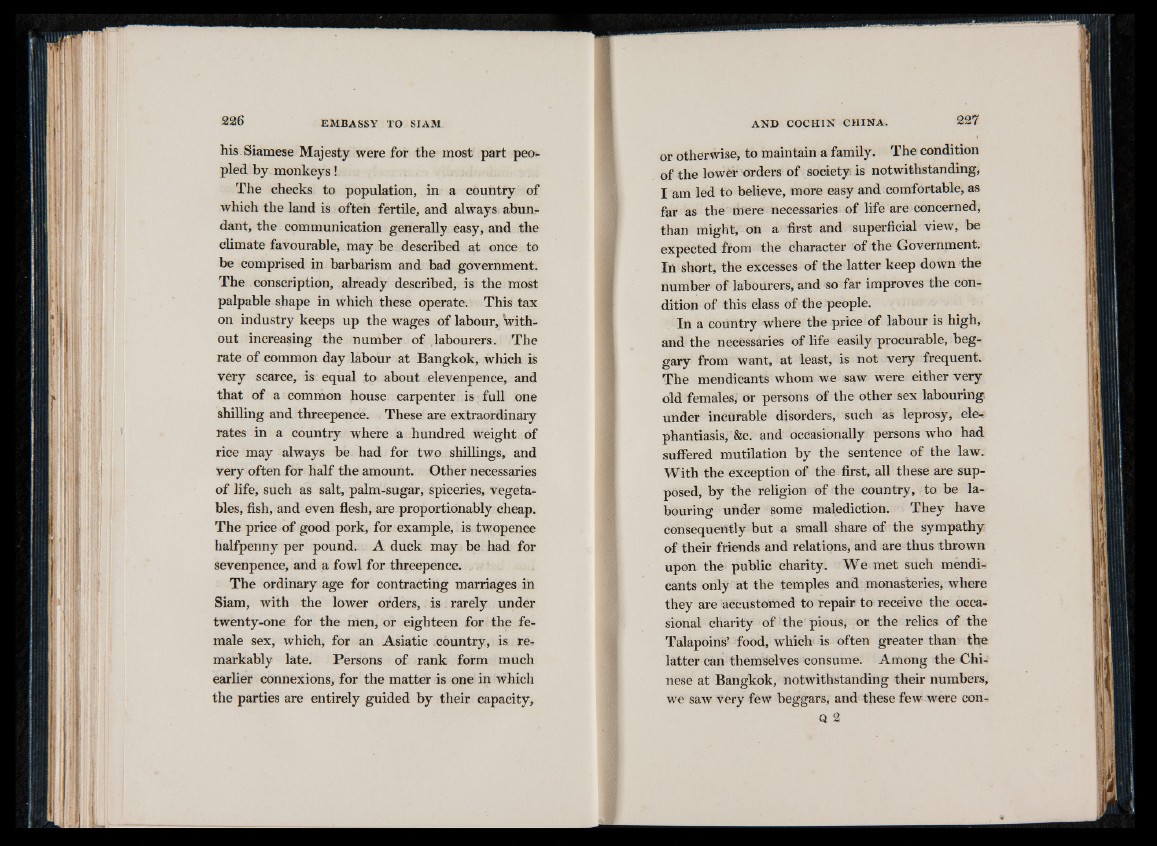
his. Siamese Majesty were for the most part peopled
by monkeys!
The checks to population, in a country of
which the land is often fertile, and always abundant,
the communication generally easy, and the
climate favourable, may be described at once to
be comprised in barbarism and bad government.
The conscription, already described, is the most
palpable shape in which these operate. This tax
on industry keeps up the wages of labour, without
increasing the number of labourers. The
rate of common day labour at Bangkok, which is
very scarce, is equal to about elevenpence, and
that of a common house carpenter is full one
shilling and threepence. These are extraordinary
rates in a country where a hundred weight of
rice may always be had for two shillings, and
very often for half the amount. Other necessaries
of life, such as salt, palm-sugar, spiceries, vegetables,
fish, and even flesh, are proportionably cheap.
The price of good pork, for example, is twopence
halfpenny per pound. A duck may be had for
sevenpence, and a fowl for threepence. .
The ordinary age for contracting marriages in
Siam, with the lower orders, is rarely under
twenty-one for the men, or eighteen for the female
sex, which, for an Asiatic country, is remarkably
late. Persons of rank form much
earlier connexions, for the matter is one in which
the parties are entirely guided by their capacity,
or otherwise* to maintain a family. The condition
of the lower orders of society is notwithstanding,
I am led to believe, more easy and comfortable, as
far as the mere necessaries of life are concerned,
than might, on a first and superficial view, be
expected from the character of the Government.
Ill short, the excesses of the latter keep down the
number of labourers, and so far improves the condition
of this class of the people.
In a country where the price of labour is high,
and the necessaries of life easily procurable, beggary
from want, at least, is not very frequent.
The mendicants whom we saw were either very
old females,; or persons of the other sex labouring
under incûrable disorders, such as leprosy, elephantiasis,
&c. and occasionally persons who had
suffered mutilation by the sentence of the law.
With the exception of the first, all these are supposed,
by the religion of the country, to be labouring
under some malediction. They have
consequently but a small share of the sympathy
of their friends and relations, and are thus thrown
upon, the public charity. We met such mendicants
only at the temples and monasteries, where
they are accustomed to repair to receive the occasional
charity of the pious, or the relics of the
Talapoins’ food, which is often greater than the
latter can themselves consume. Among the Chinese
at Bangkok, notwithstanding their numbers,
we saw very few beggars, and these few were con-
Q 2